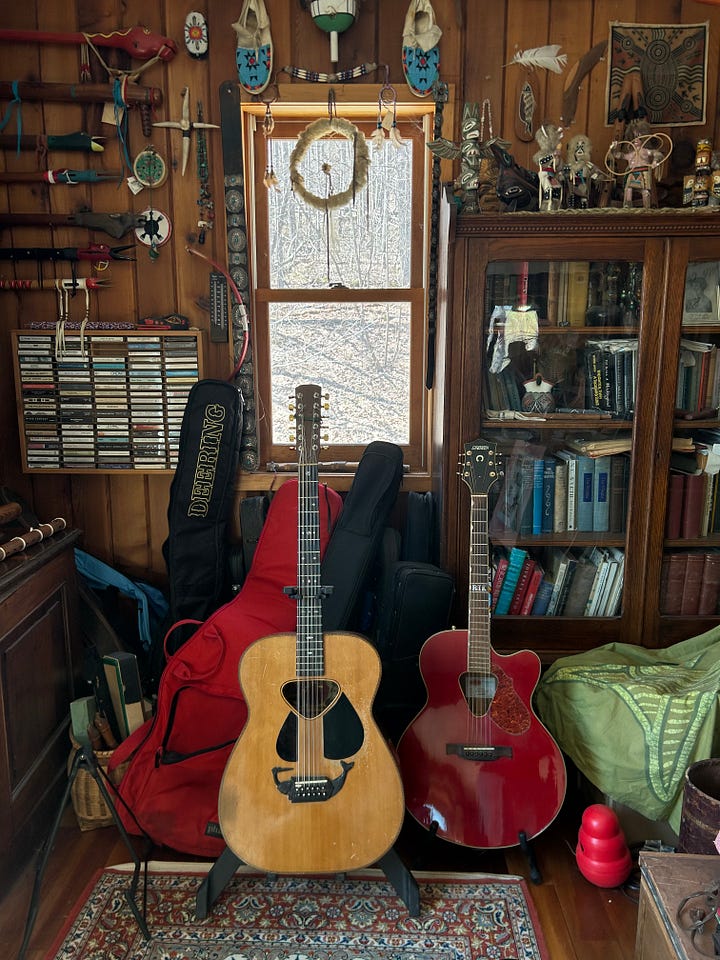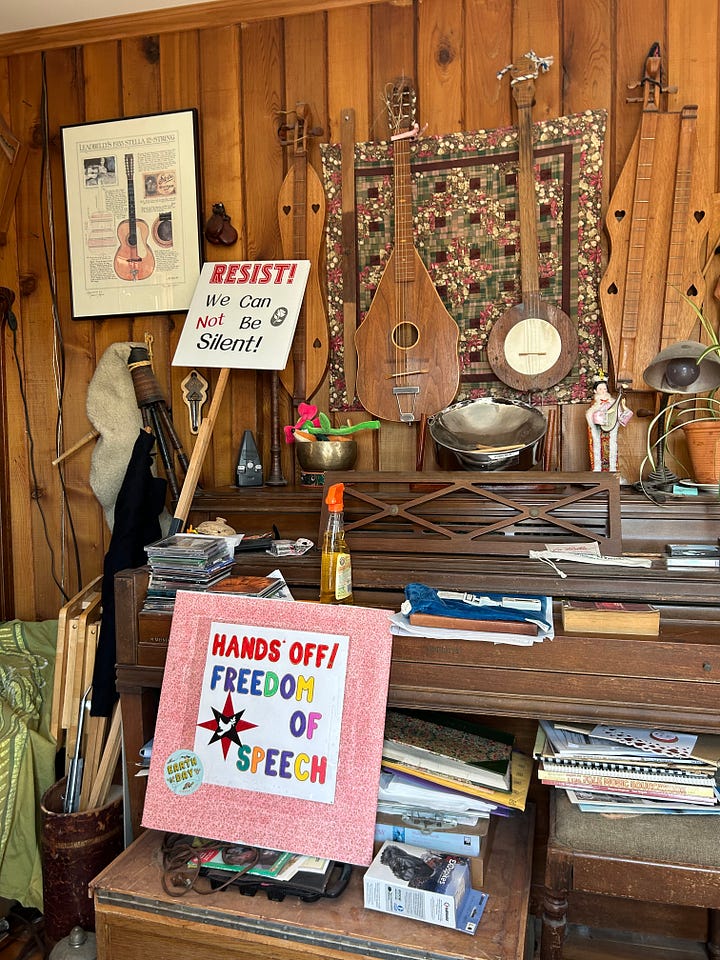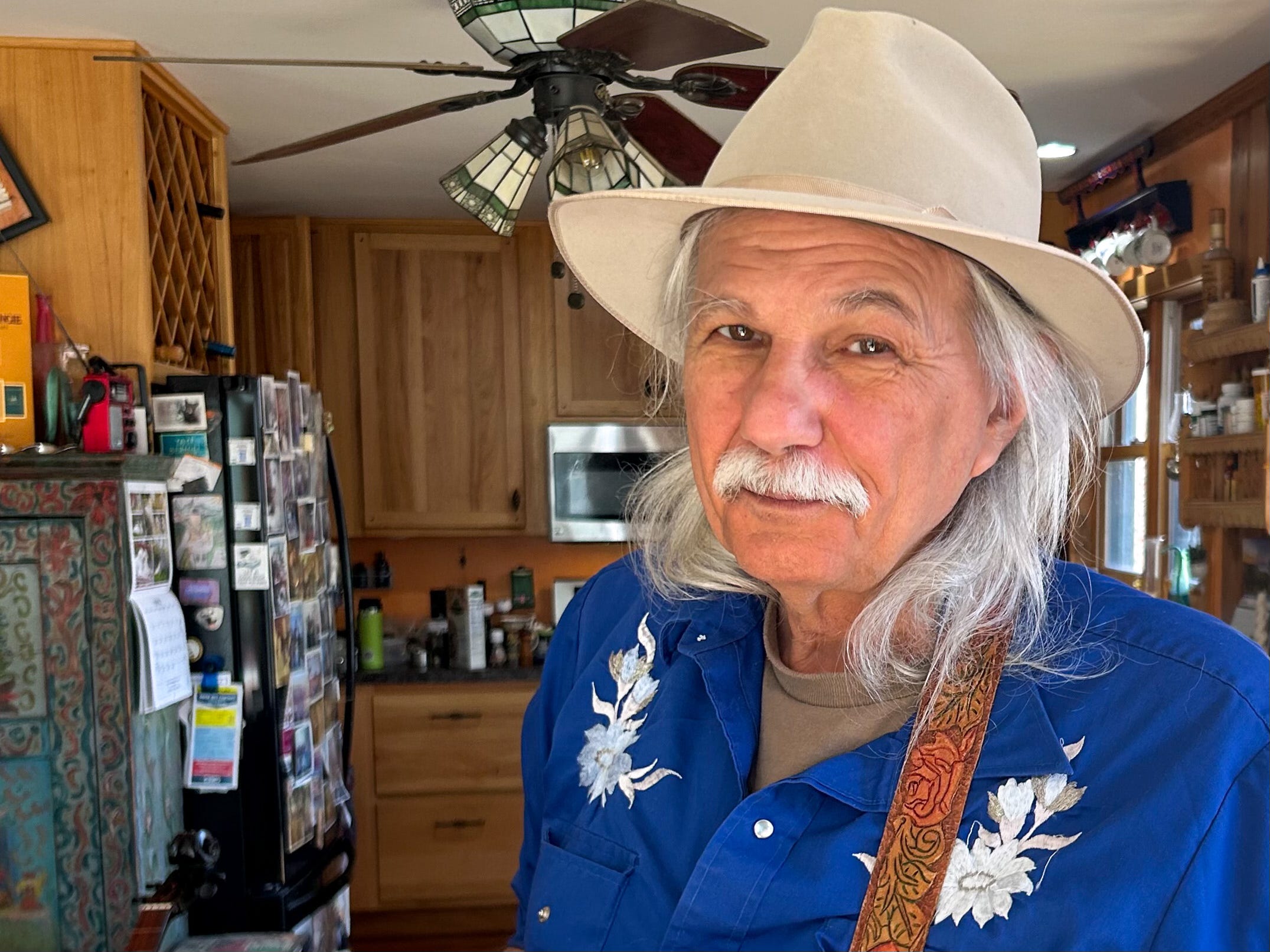Rik Palieri, An Old Folk Soul Still Singing
Hinesburg troubadour celebrates the past with new album
By Chelsea Burton, Record Intern
In the home of Rik Palieri, a country-roots and folk singer living in Hinesburg, the walls are filled with instruments: Native American flutes, guitars, banjos and more. They listen to — and help him express — the songs, sounds and stories of his life.
From East Brunswick, New Jersey, Palieri grew up listening. In hearing performers at a nearby college campus and songs around the kitchen table, he developed a love for music early on.
“I was young and just brimming with a love for folk music that was just driving my friends crazy,” Palieri said.
So, at age 15, he picked up famed folk singer Pete Seeger’s book, “How to Play the 5-String Banjo.”
That decision was the first of his lifelong career in music. Palieri ended up befriending Seeger in the 1970s; the two jammed together the first time they met — a fitting interaction that kicked off a friendship rooted in music.
Palieri has kept the letters the two sent each other over the years, and he even has a picture of Seeger’s banjo framed in his house.
He’s honored his idol on the road, too. In 2013, Palieri and folk singer George Mann toured across the Rust Belt, through the Mountain West and along the West Coast, performing “for unions and union people,” as Mann put it in an account from that year.
The tour was a re-creation of one from 1941 by the Almanac Singers, a loose group featuring Seeger and Woody Guthrie as mainstays, along with musicians such as Cisco Houston and Bess Lomax Hawes.
Outside of Seeger, Palieri has found support from his wife of 33 years, Marianna Holzer. The two live in a wooden home in Hinesburg with their big white dog, Dolina, and a vast collection of instruments — two favorites are his guitars, Pearl and Lucky.
In Hinesburg, Palieri hosts a monthly jam at the Carpenter-Carse Library, along with the Great Vermont Barn Dance Show.
“Getting people together and playing music — that’s what it’s all about,” he said.
But Palieri’s impact has extended far outside Vermont. Inspired by the music scene proliferating in Burlington, the singer started his television show, “Songwriter’s Notebook,” in 1999 on Vermont Community Access Media (now part of the Media Factory). It features musicians of any form, from songwriters to instrument-makers.
The Library of Congress contacted Palieri 10 years later, inducting his show into the archives of the American Folklife Center in Washington, D.C. His honors also include a 2023 lifetime achievement award from the New Jersey Folk Festival, which is in its 50th year in his home state.
Palieri was most excited to talk about his most recent album, “Hands of Time,” (Spotify; YouTube) which came out on streaming toward the end of last year.
He recorded it in a house where once stood Philo Records — an old recording studio based out of Ferrisburgh. The inspiration came from iconic troubadour Utah Phillips — an old folk friend and mentor of Palieri’s who had recorded at the studio in the 1970s.
Phillips lived in an old railroad car nearby. About a decade after Phillips’ death in 2008, family, friends and folk fans held a concert to raise enough money for the old flanger car to be moved to the Black Butte Center for Railroad Culture in Weed, California.
Between performances, Philo founders Michael Couture and Bill Schubart came into the old studio to talk to Palieri. “Do you hear it?” one of them said, Palieri recalled. “It’s the sound of the studio. It’s still in the walls.”
The interaction lit the spark.
All the songs are originals except for one: “Going Down the Road Feeling Bad,” a traditional American folk song. A big part of folk music tradition is “playing the old stuff,” Palieri said.
He recorded the song on an 1800s Edison phonograph cylinder — the earliest medium for recording sound for playback.


The project wasn’t his first time finding inspiration from Phillips. He was featured on the 2009 album “Singing Through the Hard Times: A Tribute to Utah Phillips,” which earned a nomination for best traditional folk album at the Grammys that year. The nomination and his experience qualified him to join the Recording Academy, the group that judges music for the awards every year.
A lot of Palieri’s songs would seem perfect on the protest line; like the folk singers of the past, Palieri’s pro-labor music works in response to a volatile political climate.
“We’re out on the street because we know how important it is to have our freedoms — to say what you wanna say and be who you wanna be,” Palieri said. “It’s more important than ever to be able to express who you are through your music and your work.”
He also has two books that capture his life and travels. “The Road Is My Mistress” is the first, from 2004. In his more recent — 2020’s “Banjo Man: Adventures of an American Folk Singer” — he hoped to say thank you to his mentors and pass along their stories.
“The stories are your biggest legacy; when you’re gone, the stories live on,” Palieri said.
His stories, enshrined over the decades, prevail.
Via Community News Service, a University of Vermont journalism internship, on assignment for the Hinesburg Record.


